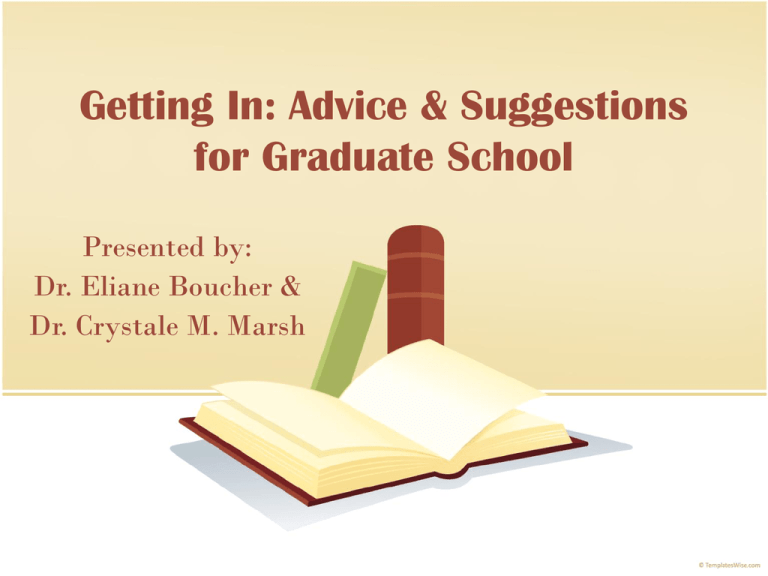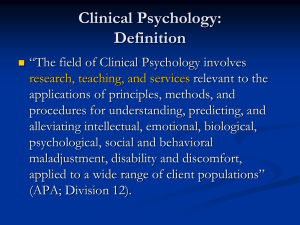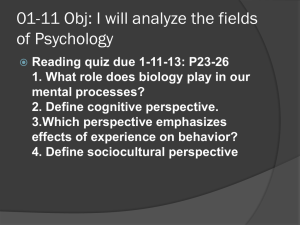our powerpoint presentation on Careers & Graduate
advertisement

Getting In: Advice & Suggestions for Graduate School Presented by: Dr. Eliane Boucher & Dr. Crystale M. Marsh Is grad school right for you? • Are you: – – – – – Interested in research? Self-motivated? Independent worker? Able to direct your own education? Able to present in front of an audience? Is grad school right for you? What are you looking for in a career?? • If you’re not sure: – the APA website offers some good advice on career paths in psychology – you can find several career trees online that might help weigh your options Career Options with a Bachelor’s in Psychology • You won’t find an entry-level job for a “psychologist” but there are many options available to you. • A bachelor’s in psychology provides you with – People skills – Analytical skills – Research Skills Career Options with a Bachelor’s in Psychology • What kinds of job opportunities will I have? – Business • Employment/Employee counselor, customer relations, claims specialist, public relations, sales representative, etc. – Mental Health & Social Services • Behavior analyst, counselor aide, family service worker, program manager, probation/parole officer, etc. Career Options with a Bachelor’s in Psychology • What kinds of job opportunities will I have? – Other areas • College admissions counselor, statistical assistant, technical writer, congressional aide, child care worker, etc. • It’s a matter of selling yourself and your degree! Psychologist? Academic? Not a bad career move… • Unemployment remains low in these careers – in 2007, 68% of new PhDs employed full-time. • In 2006, in top 10 in “Best Jobs in America” poll – College Professor ranked no. 2 – Psychologist ranked no. 10 Psychologist? Academic? Not a bad career move… • Psychologist scored high on creativity but lower in terms of flexibility, ease of entry and stress level. – looked mostly at clinical, counseling, and school psychologists – job opportunities in this area expected to grow by 19% in the next decade! Psychologist? Academic? Not a bad career move… • College professor scored high on flexibility and creativity, but slightly lower on stress level and lowest on ease of entry. – not just psychology though – but job opportunities are expected to grow by 31% in the next decade! Psychologist? Academic? Not a bad career move… • Median starting salary for new PhDs in psychology in 2007 was $61,111. – I/O had the highest, with a median starting salary of $79,222 (hired mostly in business & industry, consulting firms, government settings) So you’ve decided you want to go to Graduate School… What Now??? 1. What Do You Want To Do With Your Degree? • Practice? Help People? • Research? • Teaching? • All of the Above? Your goals should help you to decide what kind of program you want to pursue. 2. What Kind of Degree? • Master’s Degree – Typically ~2 years – Complete coursework and master’s thesis • Also complete practicum hours for clinical/counseling – Good for those who want more applied careers or for those who want a “lecturer” job 2. What Kind of Degree? • Doctoral Degree – Several options available: PhD, PsyD, or EdD – Average time to complete a PhD is 5-6 years. • Depends on program, full- or part-time status, family responsibilities, money, etc. • Eliane: 2 years for Master’s, 4 years for PhD • Crystale: 2 ½ years for Master’s, 3 years for PhD + 1 year internship 2. What Kind of Degree? • The PhD – Trains you to teach at a 4-year institution, to practice as a licensed psychologist, or work in applied settings (e.g., doing research) 2. What Kind of Degree? • The PhD – Complete coursework and dissertation • You also may need to complete a master’s thesis or second-year project depending on the university – Pass comprehensive exams – Complete internship (if in clinical/counseling) 2. What Kind of Degree? • The PsyD (Doctor of Psychology) – Developed by people dissatisfied with the scientist-practitioner model for Clinical PhD – Trains you to be a practicing clinicians in a variety of settings, placing less emphasis on research – Growing in numbers and respectability 2. What Kind of Degree? • The PsyD (Doctor of Psychology) – Complete coursework and internship, and most PsyD programs also require a doctoral dissertation – Generally, more emphasis on clinical training • e.g., students tend to get more experience with psychological testing in PsyD programs 2. What Kind of Degree? • The EdD (Educational Psychology) – Provides training in applied school psychology – Job opportunities in colleges as an academic or a practitioner, in research, and in government, schools, military, or corporate settings. 2. What Kind of Degree? • The EdD (Educational Psychology) – Complete coursework and doctoral dissertation as well as complete practicum hours in relevant settings 3. What area of psychology interests you? • Clinical Psychology – Assess & treat mental and emotional disorders. – Many clinical psychologists also do research. – Work in academic and health care settings (e.g., clinics, hospitals, community mental health centers, and private practice) – In most states, you cannot practice independently without a doctorate degree. 3. What area of psychology interests you? • Counseling Psychology – Typically work w/ normal or moderately maladjusted people, assessing needs & providing a variety of therapies. – Research evaluates effectiveness of treatments and explores novel treatment options. – Often work in academic settings as well as health care settings. 3. What area of psychology interests you? • Educational Psychology – Study how people learn and design methods and materials used to educate others. – Often work in universities (psychology & education) – Job opportunities appear to be limited to those holding doctoral-level degrees. 3. What area of psychology interests you? • School Psychology – Help to promote intellectual, social, & emotional development of children. – Work in academia and applied settings (nursery schools, daycare centers, mental health clinics, etc.) – To work in public schools, must be certified by the state and complete state-approved training program. 3. What area of psychology interests you? • Developmental Psychology – Study human development across the life-span. – Typically employed in academic settings, but also can consult on children-oriented programs. – Students with bachelor’s and master’s in developmental can work in applied settings (e.g., daycare centers, youth group programs) 3. What area of psychology interests you? • Industrial/Organizational Psychology – Study the relation between people and work. – Typically work in academia as well as business, industry, and government settings. • Students with master’s level degrees can obtain positions in applied settings. 3. What area of psychology interests you? • Social/Personality Psychology – Study how people interact with each other and how they are affected by (1) personality and (2) social environment. – Tend to work in academia, but increasingly hired in applied settings (advertising agencies, government, consulting firms – even online dating sites!) 3. What area of psychology interests you? • Forensic Psychology – Relatively new field – often a subtype of a social or clinical psychology degree. – Study legal issues from psychological perspective (e.g., line-up procedures, eyewitness accuracy) – Work in academia, law schools, research organizations, law enforcement agencies, etc. • Also can consult on court cases. 3. What area of psychology interests you? • Cognitive Psychology – aka. “Experimental Psychology” (although this sometimes refers to any non-clinical areas) – Study various behavioral processes • Learning, sensation & perception, human performance, language, memory, animal behavior, etc. – Tend to work in academia, but also employed in applied settings. 3. What area of psychology interests you? • Lots of new and emerging areas also might interest you: – Community psychology – Environmental psychology – Rehabilitation psychology – Health psychology – Psychology of Aging What Do People Do With Their Degrees? • In 2002-2003, new doctoral graduates were classified in: – Clinical Psychology (47%) – Counseling, School/Educational, & Other Applied Fields (7%) – Developmental (5%) – Social & Personality (4%) Applying to Graduate School • Competition for admission can be intense! – Usually more applicants than available spots – Research the school you’re applying to and the faculty you’d want to work with • Read some of their papers! Email them to make contact. – It’s all about fit Applying to Graduate School Finding the Right School • APA book lists programs by state & then by: – – – – – – – – – Contact Information Department Information Programs & Degrees Offered APA Accreditation Status Student Applications/Admissions Financial Information/Assistance Employment of Department Graduates Additional Information Application Requirements Applying to Graduate School Finding the Right School What should you be looking for? • Matching career goals & scientific approach – experimental vs. non-experimental • Multiple people you could work with • Adequate financial support – TAships, scholarships Applying to Graduate School Finding the Right School • What are the resources/facilities like? – Subject pool? Graduate student offices? Adequate lab space? • What percentage of people graduate? • What kind of positions do graduates seek upon completion of their degree? – Clinical? Academic? Non-Academic? • Does the University & department have a good reputation? Applying to Graduate School Finding the Right School Don’t be afraid to look out of state, or even out of country – go where the program and faculty will best fit your future goals!!! Applying to Graduate School Getting Your Application Ready • • • • • • Know the application deadline(s)! Documents required for complete packet Who receives the application Admission/application fee Make copies of everything you send Follow-up Applying to Graduate School Getting Your Application Ready 1. Application form 2. Transcript (from every post-secondary school you attended) 3. Two or three reference letters 4. Your GRE scores (sent from ETS) 5. Personal Statement (or Letter of Intent) 6. Curriculum Vitae (CV) Applying to Graduate School Getting Your Application Ready What are schools looking for in their graduate students?? • Genuine interest in research • Good fit with the program – e.g., research interests, scientific approach • Demonstrated research potential Get research experience while you can! Applying to Graduate School Getting Your Application Ready • Undergraduate grades • Graduate Record Examination (GRE) – Some schools also requite GRE Subject Test • Reference Letters – Typically three letters; one should probably be from your Independent Research supervisor. Applying to Graduate School Getting Research Experience • • • • • • Do an independent research course Work as an research assistant Do a contract study (PSYC 3391) Attend conferences if you can Join professional organizations (SPSP, APA) Know about research in their department! Applying to Graduate School Demonstrating Research Potential • Have a clear and informed statement of research interests. – Not too broad and not too specific. They pay close attention to this! • If you can, get some publications or conference presentations. – Although this is a definite advantage, it is not mandatory or even expected! Applying to Graduate School Undergraduate Grades • You don’t necessarily need a perfect GPA – Look for an increasing trend over the past 2 years • Psychology grades are most important – Statistics and research methods are very important • Need to plan early: – Keep GPA high – Take a wide range of courses, including some social sciences courses Applying to Graduate School Graduate Record Examinations • Typically, you need to write 2 tests: General & Subject • The General Test has three subsets: – Verbal, Quantitative, and Analytical Writing • Practice using ETS practice books and CD-Roms • These test scores (especially the General) are given a lot of attention, so prepare thoroughly! Applying to Graduate School Reference Letters • You will usually need 2 to 3 letters – One should be from your independent research supervisor, and one in your chosen field • Choose professors who: – Can provide specific, detailed comments on your potential as a graduate student – Have taught or worked with you recently, and, if possible, more than once Applying to Graduate School Reference Letters • When requesting letters: – Be PROFESSIONAL and ORGANIZED – Ask in person, give advance warning, and ask if they feel comfortable writing a strong letter – Give all of the forms at once, with due dates – Complete top parts of the forms yourself and provide an addressed, stamped envelope – Give them your transcript, list of courses you’re currently taking, CV, and any other useful information Some things to keep in mind… • It’s expensive! – Higher for out of state and private schools • Many schools offer financial assistance – Fellowships & Scholarships • Through the university or federal granting agencies – Assistantships in research, teaching, and some clinical positions • Also great for your CV! It’s never too early… • Start thinking about what you’ve done, what you’re interested in doing, and how to make it happen • Get connected to faculty members • Become involved in student organizations – On and Off Campus! • Keep current in your field of interest Any Questions?? Email us! Eliane: boucher_e@utpb.edu Crystale: marsh_c@utpb.edu








